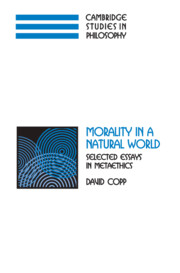Book contents
- Frontmatter
- Contents
- Preface
- Acknowledgments
- Introduction
- Part One Naturalism: Epistemology and Metaphysics
- Part Two Referring to Moral Properties
- 5 Realist-Expressivism: A Neglected Option for Moral Realism
- 6 Milk, Honey, and the Good Life on Moral Twin Earth
- 7 Referring to Moral Properties: Moral Twin Earth, Again
- Part Three Naturalism and Normativity
- Index
- References
5 - Realist-Expressivism: A Neglected Option for Moral Realism
Published online by Cambridge University Press: 19 July 2009
- Frontmatter
- Contents
- Preface
- Acknowledgments
- Introduction
- Part One Naturalism: Epistemology and Metaphysics
- Part Two Referring to Moral Properties
- 5 Realist-Expressivism: A Neglected Option for Moral Realism
- 6 Milk, Honey, and the Good Life on Moral Twin Earth
- 7 Referring to Moral Properties: Moral Twin Earth, Again
- Part Three Naturalism and Normativity
- Index
- References
Summary
INTRODUCTION
Moral realism and antirealist-expressivism are of course incompatible positions. They disagree fundamentally about the nature of moral states of mind, about the existence of moral states of affairs and properties, and about the nature and role of moral discourse. The central realist view is that a person who has or expresses a moral thought is thereby in, or thereby expresses, a cognitive state of mind. She has or expresses a belief that represents a moral state of affairs in a way that might be accurate or inaccurate. The view of antirealist-expressivism is that such a person is in, or expresses, a conative state of mind, one that consists in a certain kind of attitude or motivational stance toward something, such as an action or a person. Realism holds that moral thoughts have truth conditions and that in some cases these truth conditions are satisfied so that our moral thoughts are true. Antirealist-expressivism holds, to a first approximation, that the distinctive moral content of a moral thought does not have truth conditions.
Given these contrasts between realism and antirealist-expressivism, the view I shall propose in this chapter might seem surprising, for it combines moral realism with a chief positive doctrine of moral expressivism. I call the view realist-expressivism. It holds that our moral beliefs and judgments represent moral states of affairs and can be accurate or inaccurate to those states of affairs, which is the central realist thesis, but it also holds that, in making moral assertions, we express certain characteristic conative attitudes or motivational stances, which is a central positive view of expressivism.
- Type
- Chapter
- Information
- Morality in a Natural WorldSelected Essays in Metaethics, pp. 153 - 202Publisher: Cambridge University PressPrint publication year: 2007
References
- 2
- Cited by



